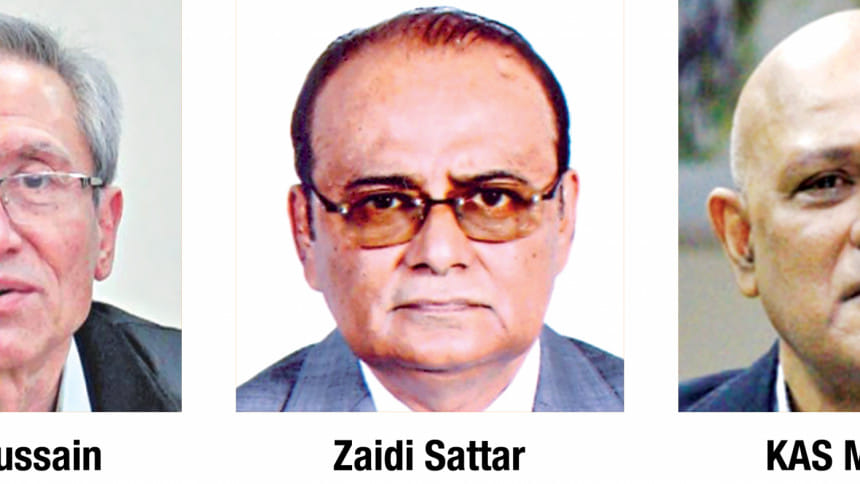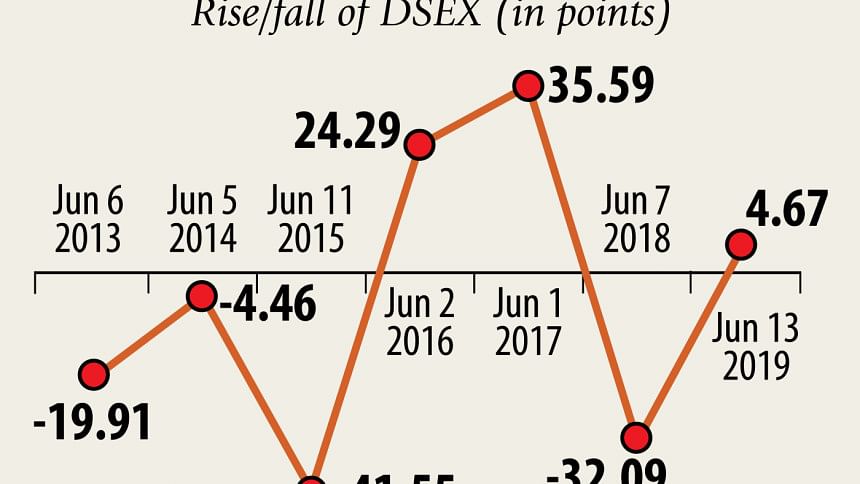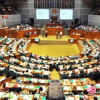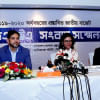Growth-friendly, albeit unrealistic

The new budget is growth-friendly and has set ambitious goals but shied away from addressing the key challenges confronting the economy, said a number of economists in their immediate reactions.
"The overall stance remains pro-growth which is actually very important to maintain," said KAS Murshid, director general of the Bangladesh Institute of Development Studies (BIDS).
"We must remember that the impact on poverty reduction and positive social sector outcomes could not have been possible without broadbased growth. Thus, the focus must be on delivering sustained, broad-based growth which requires major progress in the reform agenda."
Zaidi Sattar, chairman of the Policy Research Institute of Bangladesh (PRI), says the budget for the fiscal year of 2019-20 appears to have recognised the impending challenges, setting ambitious goals for meeting them.
"Proof of the pudding is in the eating, as they say. So, we have to wait and see the convergence between goals and actions before assessing outcomes."
However, Debapriya Bhattacharya, a distinguished fellow of the Centre for Policy Dialogue, says the finance minister has tried to formulate the budget in light of the reality, but in the end it did not fully reflect the reality.
"The finance minister talked about aspirations but did not come up with specific plans and actions needed to reach them in light of the election manifesto," he said.
The macroeconomist said the next fiscal year's projections had not been made on the basis of reality.
He cited that the revenue generation target was cut by Tk 22,000 crore for the outgoing fiscal year but it would actually fall short of Tk 85,000 crore as per the CPD's estimate.
Similarly, the expectation on the execution of the annual development programme (ADP) in the last three months of the outgoing fiscal year is not realistic to a large extent, he said.
Bhattacharya says the budget has not addressed the fiscal issues, the exchange rate of the taka and the reform of the banking sector.
The taka has remained overvalued and if it is devalued then the country will be able to get rid of many fiscal pressures. But the powerful tool at the disposal of the government is not being used in the economic management, Bhattacharya said.
"From economics point of view it is not comprehensible at all how you are foregoing revenue when revenue generation has been less?"
He called the ailing state of the banking sector "cancer". "But you will not find any acknowledgement of the bad condition of the banking sector in the budget speech."
Zahid Hussain, lead economist at World Bank Bangladesh, says target underachievement is still likely.
"Although the revenue and expenditure growth targets in the new budget are more realistic relative to previous budgets, it is still likely that both will be underachieved."
The budget promises to simplify the customs and income tax laws to make them business friendly, which is great, according to Hussain.

He says adequate provisions for transformative projects such as the Padma bridge and Dhaka Metro Rail Transit are indeed reassuring. Increased spending on the development of rural infrastruc-ture will help stem the tide of internal migration from rural areas to the mega cities.
Transformative structural reforms could make the difference between success and failure, the economist said.
Key reforms needed to achieve the budget targets with the desired stability, growth, job creation and equity effects must include: the resolution of the NPL problem; rationalisation of interest rates on national savings certificates; making tax administration friendlier to taxpayers; smarter management of subsidies and transfers to en-sure that these reach the intended targets; improving public investment management processes to the time and cost overruns in development project implementation; and reducing regulatory hassles and unpredictability to enable increased private investments.
Murshid of the BIDS said the government has behaved responsibly in terms of keeping to a sustainable debt burden.
He said while tax ceilings on individual and corporate taxes have remained unchanged, it would have been good to start scaling these rates down as these are some of the highest in the world, and improve collection.
Sattar of the PRI says for Bangladesh to sustain the momentum of more than 7-8 percent growth in the next five years, though possible, requires substantial reorientation, if not restructuring, in its current trade regime.
The former senior economist of the World Bank said Bangladesh needs to recast its protection and export policy to stimulate export growth and diversification.
"Like the tax-GDP ratio, we need to raise the trade-GDP ratio to get growth acceleration."
"The proposed budget is an ambitious one," said Selim Raihan, executive director of the South Asian Network on Economic Modeling.
"We expect clear guidelines and plans from the government how this budget is going to be implemented, given the fact that weak implementation of budget has become a norm in recent years."
He pointed out that the budget has taken a number of positive initiatives. For example, pension scheme for all, insurance coverage for government employees, wealth tax, additional tax on the regis-tration for vehicles, incentives for remittances, and tax office in every upazila.
Raihan, also a professor at the department of economics at the University of Dhaka, says there are few initiatives which can be counterproductive.
"Investment amnesty proposed for black money, without any punitive measures and political matronage and poor monitoring can make this initiative unsuccessful." With the poor structure of the tax system and laws, it is not possi-ble to increase the tax-GDP ratio significantly within the next couple of years, he said.
AF Nesaruddin, president of the Institute of Chartered Accountants of Bangladesh, says the budget size has increased by 18 percent and the development budget has risen 22 percent.
"No doubt, this is ambitious and involves lot of challenges in implementation."
He said cost escalation and time overrun of large projects are matters of concern as being experienced in Bangladesh. "We hope that the government will overcome this situation by improving its capacity." The chartered accountant says tax on stock dividend and retained earnings is not justified and is likely to discourage good companies from entering the capital market apart from impacting the existing listed companies.
Investment in high tech parks and economic zones by paying 10 percent tax is a way of whitening black money as no question will be raised as to its sources, he said.
"Overall, it's a growth-oriented budget," said Sushmita Basu, partner and leader for tax and regulatory services at PwC Bangladesh. She said the budget has focused on boosting the foreign direct in-vestment (FDI) in Bangladesh.
To promote FDI, the government has provided relief to the foreign companies from multiple layer of taxation on dividend income. Moreover, the proposal to continue with reduced tax rates between 10 percent and 15 percent for readymade garment and textile sec-tors, would also augment foreign investment, boost exports and generate employment opportunities.

 For all latest news, follow The Daily Star's Google News channel.
For all latest news, follow The Daily Star's Google News channel. 








Comments